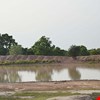

The village communities of Tampizua II in the Bawku Municipality and Azum Sapelga in the Binduri district of Northern Ghana are very happy with the field demonstration project being implemented in their communities. Located on the borders of the White Volta River these communities are experiencing various unfortunate situations such as floodings that are affecting their livelihoods because of climate related factors.
Water Resources Commission of Ghana and Ghana Country Water Partnhip (GWP Ghana) organize on 10 November 2015 a one day meeting in Bolgatenga (Northern Ghana) to validate a two parts study in preparation of the White Volta Basin (WVB) investment Plan. The report updates IWRM plan for the WVB and provides the framework for identifying water resources management and related challenges in the basin. It highlights the socioeconomic trends, population dynamics and the general water resources conditions in the basin.
A team of GWP-WA and CWP Burkina PNE had on June 11, 2015 a visit to assess the level of implementation of work on the site of the WACDEP demonstration project in Burkina Faso. This project involves the drip irrigation techniques for the efficient management of agricultural water for the benefit of vulnerable populations in the municipality of Loumbila in the center of the country.
Since the last visit in April 2015 there has been plowing work, the installation of some drip irrigation and water pumping equipment with solar energy, among others.
This third capacity-building workshop was held from 16 to 19 June 2015 and brought together participants from the Local Water Committee of North Massili, the Ministry of Animal Resources, General Directorate of Sanitation, Wastewater and Excreta, the Permanent Secretariat of the National Council for Environment and Sustainable Development, Nakanbé Water Agency and the Directorate of Water Resources.

Participation in the Climate Info Session To Support Ghana On The Road To Paris Global Agreement
The Project Manager, Mr. Maxwell Boateng-Gyimah and the Young Professional, Isaac Barnes, participated in an Information Session at the conference room of WASCAL in Accra on 17th June, 2015. This session was organised by the European Union in Ghana in collaboration with West Africa Science Service Center on Climate Change and Adapted Land Use (WASCAL). The meeting was chaired by His Excellency Frédéric Clavier, the French Ambassador to Ghana and Ambassador John Benjamin, British High Commissioner to Ghana. Other participating institutions included the French Embassy, Environmental protection Agency (EPA), Kasa Ghana, and Water Aid Ghana (WAG).
An onsite meeting was attended by the main actors involved in the implementation of the demonstration project in order to assess the progress.
As of April 29, 2015, IRRIFASO has completed the installation of drip irrigation system. They also tested the system with the existing pump on site. The conclusion is that the system is operating normally, the pressure achieved was 0.3 bar considered to be sufficient for such a system.
Burkina CWP has initiated a series of meetings with some foreign embassies in Ouagadougou. Thus, a delegation met with the Ambassador of Morocco in Ouagadougou, Mr. FARHAT BUAZZA on April 20, 2015 for a courtesy visit to present the CWP and its portfolio of projects for a possible collaboration. The Ambassador welcomed the visit and thanked the Chair and his team.
The delegation met on April 23, the Ambassador of South Africa, HE Mr. Gangumzi TSENGIWE, the Ambassador of the Kingdom of Belgium in Burkina Faso, Mr Philip HEUTS.
The Ghana Country Water Partnership (CWP-Ghana) supported Mr. Yussif Rahmani (one of the participants in the Media training workshop held in September, 2014) from Quality FM in the Garu Tempane District to host a talk show in the Tampizua I community in the Kusaal language. This was a follow-up to an earlier show held in December 2014 in English at the premises of the radio station where it was recommended to organise one in the local dialect to disseminate widely the information to peasant farmers.
The Ghana Country Water Partnership (CWP-Ghana), as a way forward to the Media Training which was held in September last year, supported the Ghana WatSan Journalists Network (GWJN) to carry out a three day field activity in order to determine access to water in some areas of Accra. The exercise was held from 19th to 21st March, 2015.
The purpose for the activity was to ascertain the extent of access to water and sanitation services in some communities in Accra. In all, there were 18 participants in the exercise from, Wash Times, Xinhua News Agency, The Accra Times, Today Newspaper, Daily Guide, Daily Graphic, Weekend Sun, Metro TV, Starr FM, The General Telegraph and Ghanaian Times.